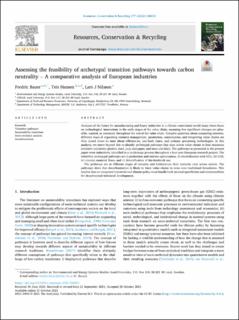| dc.contributor.author | Bauer, Fredric | |
| dc.contributor.author | Hansen, Teis | |
| dc.contributor.author | Nilsson, Lars J. | |
| dc.date.accessioned | 2022-08-24T12:37:27Z | |
| dc.date.available | 2022-08-24T12:37:27Z | |
| dc.date.created | 2022-03-10T23:39:23Z | |
| dc.date.issued | 2022 | |
| dc.identifier.citation | Resources, Conservation and Recycling. 2022, 177, 106015. | en_US |
| dc.identifier.issn | 0921-3449 | |
| dc.identifier.uri | https://hdl.handle.net/11250/3013304 | |
| dc.description.abstract | Analyses of the future for manufacturing and heavy industries in a climate constrained world many times focus on technological innovations in the early stages of the value chain, assuming few significant changes are plausible, wanted, or necessary throughout the rest of the value chain. Complex questions about competing interests, different ways of organising resource management, production, consumption, and integrating value chains are thus closed down to ones about efficiencies, pay-back times, and primary processing technologies. In this analysis, we move beyond this to identify archetypal pathways that span across value chains in four emissions intensive industries: plastics, steel, pulp and paper, and meat and dairy. The pathways as presented in the present paper were inductively identified in a multi-stage process throughout a four-year European research project. The identified archetypal pathways are i) production and end-use optimisation, ii) electrification with CCU, iii) CCS, iv) circular material flows, and v) diversification of bio-feedstock use.
The pathways are at different stages of maturity and furthermore their maturity vary across sectors. The pathways show that decarbonisation is likely to force value chains to cross over traditional boundaries. This implies that an integrated industrial and climate policy must handle both sectoral specificities and commonalities for decarbonised industrial development. | en_US |
| dc.language.iso | eng | en_US |
| dc.publisher | Elsevier | en_US |
| dc.rights | Navngivelse 4.0 Internasjonal | * |
| dc.rights.uri | http://creativecommons.org/licenses/by/4.0/deed.no | * |
| dc.subject | Transition pathways | en_US |
| dc.subject | Sustainability transitions | en_US |
| dc.subject | Socio-technical analysis | en_US |
| dc.subject | Decarbonisation | en_US |
| dc.title | Assessing the feasibility of archetypal transition pathways towards carbon neutrality – A comparative analysis of European industries | en_US |
| dc.type | Peer reviewed | en_US |
| dc.type | Journal article | en_US |
| dc.description.version | publishedVersion | en_US |
| dc.rights.holder | © 2021 The Author(s) | en_US |
| dc.source.volume | 177 | en_US |
| dc.source.journal | Resources, Conservation and Recycling | en_US |
| dc.identifier.doi | 10.1016/j.resconrec.2021.106015 | |
| dc.identifier.cristin | 2008985 | |
| dc.relation.project | EC/H2020/730053 | en_US |
| dc.source.articlenumber | 106015 | en_US |
| cristin.ispublished | true | |
| cristin.fulltext | original | |
| cristin.qualitycode | 1 | |

